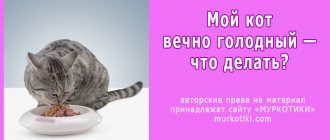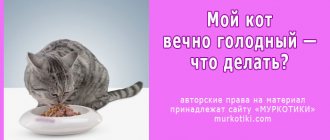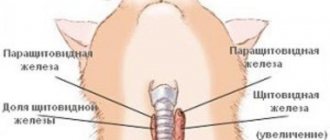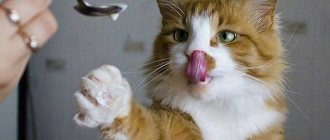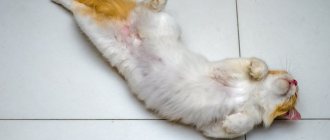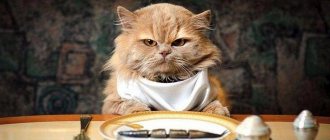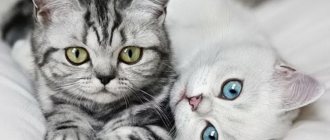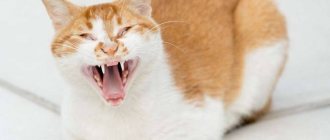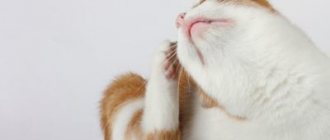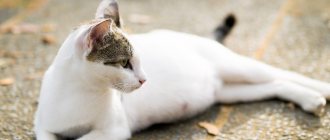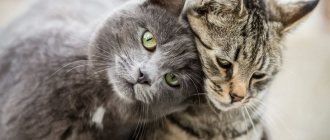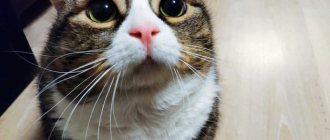A pet's excessive appetite should not be ignored. This could be a signal of serious health problems or a nervous system disorder. But most often we are talking about physiological reasons.
Finding out what happened is the main task of a loving owner. Ignoring the reasons why your cat constantly asks to eat can lead to unpleasant consequences for your pet.
Cat nutrition standards
As you know, there are two types of cat food: dry and wet. Feed rates depend on age, breed, health status, and body weight. The last factor is the most significant.
Proper nutrition of animals is the key to their health
For your information! The daily intake of wet food is on average 5% of the animal’s body weight.
The amount of dry food is calculated taking into account the pet’s weight:
- up to 3 kg - 25 g;
- from 3 to 4 kg - 40 g;
- 4-5 kg - 55 g;
- with a weight of more than 5 kg - 12 g per 1 kg of body weight.
For the first 4-5 weeks, kittens eat only cat’s milk and determine the amount of food they need. Then small pets can be fed with high-quality dry and wet food, which is more balanced in composition than homemade food. Its quantity also depends on several factors.
Important! It would be best to use the dosing table, which manufacturers usually place on the packaging.
Situation 8: we got a second pet - and the first one began to attack food
“We have a cat who has always had a normal appetite, sometimes even a bad one. But as soon as we got a kitten, after about a week the cat began to eat like crazy. Sweeps everything they give. A month has already passed and she has recovered a little. What with her?"
This is a common situation: the feeling of competition encourages the animal to eat more greedily. Often cats begin to eat a lot when under stress or when a new family member, not necessarily even an animal, arrives. In this case, increased appetite can last for several months until the stress passes, or remain forever, because... competition will not go away. The only thing that can be done here is to feed the pets separately, or to provide the old-timer with a higher, secluded place, for example, on a windowsill, and protect him from the newcomer’s attempts to take away the food.
The role of water in the diet
The cat asks the cat: options for how to calm it down at home
The cat must have constant access to clean water. This is especially important if your pet eats dry food. If the animal's fur is shiny and silky, and it urinates at least twice a day, then there is enough water.
Clean water is essential when feeding kibble.
conclusions
Constantly searching for food is normal for cats. If a cat asks to eat or steals, then in most cases this is not because he really needs food for physiological reasons. Asking for food between meals is not a reason to panic and think that the cat is malnourished. On the contrary, if the cat does not ask to eat, this usually means that he has overeaten. But you should be wary if the cat, in addition to increased appetite, has underweight and visible health problems, for example, dull hair and falling out, watery eyes, or something else unusual happens. In this case, you should definitely see a veterinarian.
In general, many cats love to eat, so they constantly beg for food, even if there is no physiological need. This is a kind of hunting: wild brothers hunt mice, and domestic ones, out of sporting interest, can beg food from the owner or steal. Therefore, you need to treat begging calmly, without giving your pet a treat every time he asks.
Rate and share!
How often to give food to adult animals
Some owners feed cats as soon as they start meowing and asking for food. This is a big mistake. Overeating can lead to obesity and a number of diseases.
After sterilization, the cat asks the cat: is this normal and what to do?
It is better to feed an adult cat twice a day, morning and evening at the same time. This diet promotes the proper functioning of the animal’s gastrointestinal tract.
Note! There are exceptions. Sometimes sick cats need to be fed little by little 3-5 times a day. For pregnant and lactating pets, the frequency of meals also increases.
Situation 3: the cat does not eat enough after changing food
“After the operation to remove the testicles, we switched the cat to castrate food, because this is considered correct. However, now he asks for food all the time. As soon as we return the old food, everything returns to normal, but we understand that we cannot feed it, because... castrati are prone to obesity. Why does the cat constantly ask for food? What to do?"
In fact, not all castrates gain weight after having their testicles removed. Many people do not even experience increased appetite, although this is rare. Feeding them regular food, not for castrati, is quite possible and, rather, even necessary. We discussed this situation in detail in another publication.
How often to feed kittens
How a cat behaves before giving birth: yelling and other changes in behavior
Small pets are fed more often. A newborn kitten, which for various reasons has been left without its mother's milk, is given food every two hours without stopping at night. Babies up to two months of age are fed every 6 hours. At the age of 4-5 months, kittens are transferred to a three-time diet. After six months they can be fed two or three times a day.
Kittens require special attention
Why does a cat eat a lot but not get enough?
If the owner provides a sufficient amount of food, but the cat is constantly hungry, you need to find out why this is happening. There may be several pathological and physiological explanations for this.
Among cats, there is such a thing as polygapia - a constant feeling of hunger. It can appear against a background of high nervous tension in animals. In stressful situations, their appetite increases, that is, they, like people, can eat stress and gain excess weight.
Important! If your cat is constantly asking for food, it is most advisable to seek help from a veterinarian to get professional advice.
Sometimes it happens that a cat constantly and persistently asks for food, but remains thin. Additional symptoms such as vomiting, constipation, diarrhea, and depression may appear. In this case, you need to examine your pet for the presence of parasites in the body, which absorb nutrients, and the animal begins to lose weight. Roundworms of various types are often found in cats. Worm infestation is a serious disease that needs to be treated promptly.
Obesity is the result of overeating
It happens that animals have a disturbance in the absorption of nutrients. In this case, weight gain is also noted. Such a disorder may be congenital, or may be the result of some pathology in the body. In this case, immediate contact with a veterinarian is necessary.
A cat that constantly begs for food may have endocrine diseases. The most common of these is diabetes mellitus. Its main features:
- increased appetite. The cat eats a lot and greedily and quickly gets fat;
- strong thirst. The pet begins to drink a lot and often;
- frequent urination;
- Sometimes the animal may smell of acetone.
Note! Hypothyroidism also occurs in cats, when the thyroid gland does not produce enough hormones. It is these hormones that regulate the metabolic rate in the body of animals. A veterinarian will also help here, making a diagnosis and prescribing treatment.
A hormonal disorder called acromegaly occurs in animals. It is associated with a very large amount of growth hormones that are produced in the cat's body. The disease is manifested by increased appetite, intense thirst, and widening of the muzzle in animals. A large number of hormones disrupts the process of insulin production. As a result, the cat develops diabetes mellitus. In this case, it is very important to contact a veterinarian in a timely manner.
It is quite normal for a cat to constantly want to eat while expecting or feeding offspring. Under no circumstances should it be overfed. Excess weight can cause complications during childbirth. The diet of a nursing cat should be high in calories, but moderation is also important here.
A mother cat needs to feed her offspring, so her diet must be under control
It happens that the animal is forced to starve for some time. This may be the period before surgery or a time when the owner is absent and does not have the opportunity to feed the pet. When very hungry, the cat will meow and ask for food even after being fed.
Important! It should be remembered that a very hungry pet should not be given large portions of food. The animal may begin to vomit or begin to diarrhea. It is necessary to feed often and little by little, and not to succumb to provocations in the form of meowing and screaming.
A decrease in ambient temperature can cause an increased appetite in the animal. It is known that during the cold season, the body spends more calories to maintain heat, and accordingly, appetite increases to replenish energy reserves.
Old, long-lived cats often get cold. To keep warm, they need a lot of calories, i.e. food.
Sometimes animals have to be given enzyme, anticonvulsant or hormonal drugs. A side effect of these medications is increased hunger.
If a cat is neutered, over time he may become very greedy for food. The same thing often happens to a cat after sterilization. Owners often wonder why a sterilized cat eats so much. Animals become sedentary, prefer to sleep a lot, spend fewer calories, but constantly ask for food. In this case, the pet must consume about 70% of the food that it ate before, otherwise obesity is inevitable, which will lead to bad consequences.
These are the main reasons why a cat eats a lot and does not get enough.
Veterinarian assistance is often required
In what cases is it necessary to consult a doctor:
- the cat feels sick and vomits;
- the pet's body temperature has increased;
- the animal meows pitifully, it is noticeable that something hurts;
- diarrhea or constipation appeared;
- an increase in appetite is accompanied by weight loss;
- there is intense thirst and frequent urination;
- presence of traces of blood in feces or urine;
- the cat became lethargic and inactive;
- the animal is hiding and wants to be alone;
- the animal's fur has become dull and matted;
- discharge from your pet's nose or eyes;
- unusually active behavior.
Situation 2: the cat does not get enough of two meals a day, previously he ate food twice a day
“My cat wants to eat all the time. The feeling that he simply does not get enough of natural food. When I was at the stern, I ate twice a day and didn’t ask for extra. Now he follows me around all day and looks at me with pitiful eyes. He eats 5% of his weight, that is, according to science. Does he really need more? What if he gets fat then? The cat asks for food - does it mean he’s missing something?
Most likely, this condition will pass some time after switching to a natural diet. Many cats are delighted with raw meat, because it is the right food, so at first they try to eat more. In addition, the body also needs to be rebuilt. There is a study that shows that by eating approximately the same food for 2-4 weeks, the cat gets used to it - and its body learns to regulate activity in accordance with the amount of energy supplied by the food. At the same time, the body gets used to a certain amount of food and learns to get enough of it. That is, a kind of adjustment of the body to the proposed type of nutrition occurs. The situation usually returns to normal within 1-3 months.
But it’s still worth analyzing the cat’s activity and condition. If you see a lack of body weight (ribs and spine stick out) or the cat is overly active, then perhaps he is missing 5%. Then the amount of food can be increased slightly or made more caloric. Lean pork, chicken heads, and poultry thighs with skin help with this.
If the cat is in normal condition, he is well-fed, and his activity is so-so, in addition, the animal is castrated, which is why it may also feel an excessive appetite, it does not need additional food. Then you can resort to tricks to better saturate your cat with food of the same calorie content. For example, if you serve meat in small or medium-sized pieces, try cutting them larger. When a cat has to try hard to eat the “prey”, work hard with its jaw, it takes longer - then the animal realizes faster that it is full. Similar mechanisms operate in humans. Secondly, active jaw activity is an important element of eating due to a number of neurophysiological reactions, which results in increased levels of happiness and decreased stress.
When there is no need to worry
Sometimes a pet's constant hunger can be explained by natural causes, the character and behavior of the animal. A cat or kitty may simply be very active and spend a lot of calories. This is most common in young individuals. Accordingly, such pets will constantly feel hungry.
An increase in appetite in pregnant and lactating cats is also considered quite normal.
Note! Often a cat asks for food when he wants to attract attention. In fact, it requires communication. In this case, you need to pet the pet, chat with it and play.
Situation 6: old cat constantly asks for food
“I have an old cat who is always hungry - what should I do? This didn't happen before. We follow the lead and give more food, but the cat still lost weight.”
The answer to the question of why a cat is always hungry may be advanced age. Firstly, some older cats suffer from senile dementia (although in relation to cats it is more correct to say “cognitive dysfunction”), which is why their eating behavior may be impaired: their appetite can become either reduced or increased.
Secondly, if a cat wants to eat all the time, perhaps she actually wants affection and attention, and she associates food with these pleasant things. As you know, old cats need attention more than young ones.
Also, the reason for increased appetite in old people may be that with age, digestion begins to work sluggishly - and beneficial substances coming from food are absorbed less well. In addition, older cats may have reduced immunity, which results in the active development of worms. Often diabetes, which cats sometimes acquire along with excess body weight, causes increased appetite.
If you see that the cat is hungry all the time, but despite the fact that he is given food, he is losing weight, this is a signal - you need to see a veterinarian. Perhaps the fact is that the worms eat most of the nutrients. Perhaps the body itself does not absorb nutrients properly. Also, thinness with increased appetite occurs due to cancer and other diseases. In any case, you need to make a diagnosis and find out the cause of the increased appetite.
What to do if your cat starts eating a lot
First of all, you need to carefully observe your pet. If there are any additional symptoms that are abnormal and cause concern, you should immediately contact your veterinarian. When the specialist asks about symptoms, the owner must describe in detail the facts that alarm him.
Important! If everything is fine with the animal’s health, you can try changing the food to a more nutritious one. But there is no need to get too carried away here.
Under no circumstances should you give in to the persistent requests of your pet, who may even yell for food. It is important to accustom him to a eating routine. Sometimes the problem is more about the owner than the animal. If the owner allows himself to be manipulated and gives food on demand, this can lead to a serious deterioration in the health of the cat.
Food should not be given on demand
Thus, every owner must be attentive to his pet, consistent in his actions and not forget that the animal’s health is in his hands. If necessary, be sure to seek help from a veterinarian.
Situation 1: a hungry cat does not eat up natural food; previously drying was always available
“My cat, until she was 2 years old, ate only dry food; it was always available. Now we have switched her to natural food twice a day and cannot feed her: she constantly asks for food throughout the day. Why does a cat always want to eat?
Over the course of 2 years, the cat got used to a diet where food was available all the time. Now she is limited to two meals, which is unusual for her and can even cause stress. Naturally, it is inappropriate to keep natural food available at all times; such nutrition requires 2-3 meals a day. However, the cat needs time to readjust. This takes from 1 to 3 months. At this time, if possible, you can divide the daily portion into 3 meals instead of two, and then, when the cat gets used to this regimen, remove the daily meal, again dividing it between breakfast and dinner. If it is not possible to feed three times a day, you will just have to wait until the body readjusts.
Article continues after advertisement
